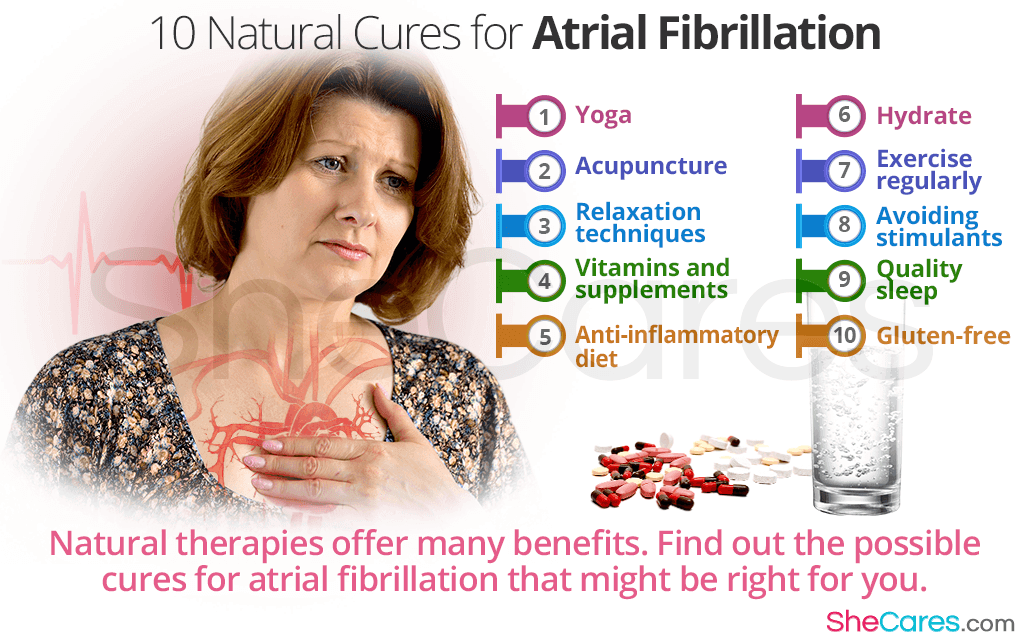Modern medicine offers numerous pharmalogical regimens and surgical interventions to treat atrial fibrillation. The outcome is not always successful and often has unpleasant side effects, so many women suffering from AFib shift their attention towards natural cures for this difficult condition.
Although various natural therapies and lifestyle changes have been shown helpful in treating atrial fibrillation, there is no scientific evidence that any one of them cures it alone, so they are most beneficial when used in combination. Continue reading to explore the possible natural cures for atrial fibrillation that might be right for you.
Yoga
Studies about the effects of yoga on atrial fibrillation have reported that it can decrease its symptoms by 45% and lower the frequency of the individual episodes. It is also said to lower the heart rate, systolic blood pressure, as well as reduce anxiety and depression.
Acupuncture
This ancient practice can reportedly bring the heart rate down to normal much faster and more effectively than some anti-arrhythmic medications used in atrial fibrillation, such as amiodarone. Recurrences of AF have also decreased with acupuncture.
Relaxation Techniques
Meditation, breathing techniques, and other relaxation practices increase the parasympathetic system, causing a decrease in the heart rate, which might be effective in suppressing heart arrhythmias, including AF.
Vitamins and Supplements
Fish oil, vitamin C and E, magnesium, selenium, CoQ10, and an amino acid N-acetyl-cysteine have been shown to improve the heart's function. They can also decrease incidence of arrhythmias by lowering the stress levels, which triggers atrial fibrillation.
Herbal supplements, such as Wenxin keli or hawthorn, exhibit anti-arrhythmic effects, but should be used with caution as they might interact with some AFib medications.
Anti-inflammatory Diet
A diet rich in fiber from cereals, legumes, fruit, and vegetables; lean meat and fish; and low-fat dairy is not only good for the digestive tract, but also decreases inflammation and helps to lower cholesterol, triglycerides, and blood pressure. Healthy oils, green tea, cocoa, and nuts are also hearty-healthy.
Hydrate
Dehydration is one of the most common triggers of atrial fibrillation, so staying hydrated is essential in the prevention and management of AF. Water and coconut water, which contain magnesium, potassium, and are low in sodium, are the best options to fulfill the daily fluid requirements.
Exercise Regularly
Regular, moderate exercise have been shown to improve cardiac function, reduce stress and anxiety, and improve diabetes, hypertension, and obesity, all which are the known risk factors for atrial fibrillation.
Avoiding Stimulants
Studies have reported that women who overuse caffeine, energy drinks, alcohol, and cigarettes are more likely to develop atrial fibrillation and suffer from more frequent AF episodes. Air pollution is another AFib trigger that should be avoided as much as possible.
Quality Sleep
Women who suffer from sleeping problems may develop atrial fibrillation. Try to sleep 7-9 hours a day to reduce stress and anxiety and allow your body to restore yourself and remain strong and healthy.
Gluten-free
Studies, which found a link between celiac disease and atrial fibrillation, suggest that a gluten-free diet might potentially be helpful for AFib patients. Food producers now offer numerous products without gluten, such as bread or pasta, while many foods, like beans, rice, potatoes, or soy, naturally do not contain gluten.
The primary focus in managing atrial fibrillation is stroke prevention, so any practices that improve heart's health also reduce the risk of AF and its burden. The alternative approaches to AFib offer many benefits, but before making any modifications to your prescribed treatment, consult with your doctor to make sure they are safe.
